UNIVERSITY TEACHERS AND THE FORMATION OF READERS IN HIGHER EDUCATION
DOI:
https://doi.org/10.34019/2447-5246.2022.v27.37820Abstract
The aim of this study is to evaluate the perceptions of higher education teachers from an institution located in the metropolitan region of São Paulo (Brazil) about the task of contributing to the fostering of theirs students’ reading practices. For this, a survey was carried out with teachers of the Management and Computer Science courses, in order to collect information about a) the profile of the participants; b) their reading habits, practices and preferences; c) their perceptions of students’ reading habits and skills; d) their teaching practices (ways of using and encouraging reading). Among other aspects, results show that teachers have a predominantly instrumental conception of reading and do not clearly see themselves as responsible for the formation of readers. Therefore, the survey suggests that efforts to encourage reading practices within the examined courses must include teachers and shall be an integral part of the educational policies assumed by the institution.
Downloads
Downloads
Published
How to Cite
Issue
Section
License
Ao submeter um artigo à revista Educação em Foco e tê-lo aprovado, os autores concordam em ceder, sem remuneração, os seguintes direitos à Educação em Foco: os direitos de primeira publicação e a permissão para que Educação em Foco redistribua esse artigo e seus metadados aos serviços de indexação e referência que seus editores julguem apropriados.

















